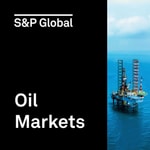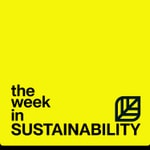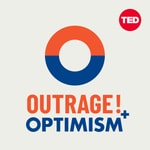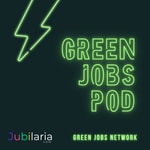All Things Sustainable – Details, episodes & analysis
Podcast details
Technical and general information from the podcast's RSS feed.
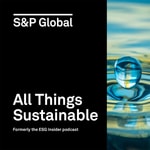
All Things Sustainable
S&P Global
Frequency: 1 episode/8d. Total Eps: 287

Recent rankings
Latest chart positions across Apple Podcasts and Spotify rankings.
Apple Podcasts
🇨🇦 Canada - businessNews
26/07/2025#23🇬🇧 Great Britain - businessNews
26/07/2025#51🇩🇪 Germany - businessNews
26/07/2025#49🇺🇸 USA - businessNews
26/07/2025#86🇨🇦 Canada - businessNews
25/07/2025#27🇬🇧 Great Britain - businessNews
25/07/2025#31🇺🇸 USA - businessNews
25/07/2025#58🇨🇦 Canada - businessNews
24/07/2025#43🇬🇧 Great Britain - businessNews
24/07/2025#37🇩🇪 Germany - businessNews
24/07/2025#99
Spotify
No recent rankings available
Shared links between episodes and podcasts
Links found in episode descriptions and other podcasts that share them.
See allRSS feed quality and score
Technical evaluation of the podcast's RSS feed quality and structure.
See allScore global : 73%
Publication history
Monthly episode publishing history over the past years.
The rise of the ESG controller in the sustainability talent landscape
Season 6 · Episode 43
vendredi 30 août 2024 • Duration 23:57
The US is heading into Labor Day weekend, and at the ESG Insider podcast we’re turning our focus to the topic of jobs. Specifically — how is the talent landscape changing for ESG and sustainability professionals?
To learn more we speak to Ellen Weinreb, founder of Weinreb Group, a boutique recruiting firm focused on ESG and sustainability candidates. Ellen points to an increasing focus on compliance, data governance and regulation, which she says is leading to a “big rise” in ESG controller roles.
“Right now the latest shift is around regulatory and then also around the nonfinancial reporting and the roles that the regulators are playing in terms of getting the data that's auditable and verified and assured. And so, there are more roles popping up in the controller's office,” she tells us.
Ellen also talks about why companies are seeking sustainability leaders who can be “corporate chameleons” — and what these candidates are seeking in potential employers. She shares her advice for candidates earlier in their careers considering a sustainability role. And she talks about what’s next for sustainability recruiting.
Listen to our previous episode on how the hunt for ESG talent is evolving here: https://www.spglobal.com/esg/podcasts/how-the-global-esg-recruiting-landscape-is-changing
Learn more about the event S&P Global Sustainable1 is hosting during Climate Week NYC here: https://www.spglobal.com/esg/events/climate-week-nyc-2024
Read research from S&P Global Sustainable1: Prioritizing employee wellbeing may help stem the tide of rising turnover: https://www.spglobal.com/esg/insights/featured/special-editorial/prioritizing-employee-wellbeing-may-help-stem-the-tide-of-rising-turnover
This piece was published by S&P Global Sustainable1, a part of S&P Global.
Copyright ©2024 by S&P Global
DISCLAIMER
By accessing this Podcast, I acknowledge that S&P GLOBAL makes no warranty, guarantee, or representation as to the accuracy or sufficiency of the information featured in this Podcast. The information, opinions, and recommendations presented in this Podcast are for general information only and any reliance on the information provided in this Podcast is done at your own risk. This Podcast should not be considered professional advice. Unless specifically stated otherwise, S&P GLOBAL does not endorse, approve, recommend, or certify any information, product, process, service, or organization presented or mentioned in this Podcast, and information from this Podcast should not be referenced in any way to imply such approval or endorsement. The third party materials or content of any third party site referenced in this Podcast do not necessarily reflect the opinions, standards or policies of S&P GLOBAL. S&P GLOBAL assumes no responsibility or liability for the accuracy or completeness of the content contained in third party materials or on third party sites referenced in this Podcast or the compliance with applicable laws of such materials and/or links referenced herein. Moreover, S&P GLOBAL makes no warranty that this Podcast, or the server that makes it available, is free of viruses, worms, or other elements or codes that manifest contaminating or destructive properties.
S&P GLOBAL EXPRESSLY DISCLAIMS ANY AND ALL LIABILITY OR RESPONSIBILITY FOR ANY DIRECT, INDIRECT, INCIDENTAL, SPECIAL, CONSEQUENTIAL OR OTHER DAMAGES ARISING OUT OF ANY INDIVIDUAL'S USE OF, REFERENCE TO, RELIANCE ON, OR INABILITY TO USE, THIS PODCAST OR THE INFORMATION PRESENTED IN THIS PODCAST.
What's next for voluntary carbon markets
Season 6 · Episode 42
vendredi 23 août 2024 • Duration 31:41
On the ESG Insider podcast, we often hear that achieving the low-carbon transition on a global scale will require a mix of solutions. Carbon markets are one key tool available to companies and countries.
In this episode, we bring you the second of a two-part miniseries on carbon markets. In part one last week, we explored how voluntary and compliance carbon markets work. We also heard that voluntary carbon markets have faced some recent challenges and criticisms that have eroded confidence and dampened trading in those markets.
In this episode, we dig into what is driving those challenges and how the voluntary market is evolving to address the concerns. We explore different types of voluntary carbon credits that are currently available in the market. And we hear how voluntary markets can play a role in international decarbonization efforts.
We talk with Dr. Spencer Meyer, Chief Ratings Officer at BeZero Carbon, which provides project-level credit risk assessments for voluntary carbon credits. Spencer explains that carbon markets are relatively new and are still developing the necessary safeguards and infrastructure.
"What we've been seeing over the last year or two are quite a few new initiatives really to improve the quality and integrity in the market," says Spencer. "In general, I think the market is moving in a strong direction. But it will take some time to work out the kinks."
We also speak with Frédéric Gagnon-Lebrun, Global Director for Climate Policy, Finance and Carbon Markets at South Pole, a carbon project expert and climate consultancy.
Listen to part one of our carbon markets miniseries, "Exploring the role of carbon markets in reaching climate targets," here: https://www.spglobal.com/esg/podcasts/exploring-the-role-of-carbon-markets-in-reaching-climate-targets
Listen to our episode about Article 6 of the Paris Agreement here: https://www.spglobal.com/esg/podcasts/at-cop26-why-article-6-matters-to-companies-and-investors
Click here to learn more about S&P Global Commodity Insights' research and analysis of carbon markets: https://www.spglobal.com/commodityinsights/en/commodities/energy-transition/carbon
This piece was published by S&P Global Sustainable1, a part of S&P Global.
*Episode show notes updated on August 28, 2024, with a revised description of South Pole.
Copyright ©2024 by S&P Global
DISCLAIMER
By accessing this Podcast, I acknowledge that S&P GLOBAL makes no warranty, guarantee, or representation as to the accuracy or sufficiency of the information featured in this Podcast. The information, opinions, and recommendations presented in this Podcast are for general information only and any reliance on the information provided in this Podcast is done at your own risk. This Podcast should not be considered professional advice. Unless specifically stated otherwise, S&P GLOBAL does not endorse, approve, recommend, or certify any information, product, process, service, or organization presented or mentioned in this Podcast, and information from this Podcast should not be referenced in any way to imply such approval or endorsement. The third party materials or content of any third party site referenced in this Podcast do not necessarily reflect the opinions, standards or policies of S&P GLOBAL. S&P GLOBAL assumes no responsibility or liability for the accuracy or completeness of the content contained in third party materials or on third party sites referenced in this Podcast or the compliance with applicable laws of such materials and/or links referenced herein. Moreover, S&P GLOBAL makes no warranty that this Podcast, or the server that makes it available, is free of viruses, worms, or other elements or codes that manifest contaminating or destructive properties.
S&P GLOBAL EXPRESSLY DISCLAIMS ANY AND ALL LIABILITY OR RESPONSIBILITY FOR ANY DIRECT, INDIRECT, INCIDENTAL, SPECIAL, CONSEQUENTIAL OR OTHER DAMAGES ARISING OUT OF ANY INDIVIDUAL'S USE OF, REFERENCE TO, RELIANCE ON, OR INABILITY TO USE, THIS PODCAST OR THE INFORMATION PRESENTED IN THIS PODCAST.
Bezos Earth Fund director on how to drive climate, nature action
Season 6 · Episode 33
vendredi 21 juin 2024 • Duration 23:45
In this episode of the ESG Insider podcast, we talk with Paul Bodnar, Director of Sustainable Finance, Industry and Diplomacy at the Bezos Earth Fund, about solving the finance gap for climate and nature.
The Bezos Earth Fund was created in 2020 with a $10 billion commitment from Jeff Bezos, founder of e-commerce giant Amazon. The fund aims to disperse that $10 billion in grants by 2030 to fight climate change and protect nature.
Paul talked to us on the sidelines of the GreenFin conference in New York about how to increase innovation and investments in nature, food systems, and climate change.
"What really drives fast, deep and broad change in the global economy is markets. Finance, technology, business model innovation — those things spread like wildfire. And so we have to activate those vectors in service of climate action," Paul says.
Listen to our interview with Sagarika Chatterjee, Climate Finance Director and Finance Lead for the UN Climate Change High-Level Champions here: https://www.spglobal.com/esg/podcasts/how-ai-could-solve-the-data-challenge-for-climate-nature-and-the-energy-transition
GreenBiz Group hosts the GreenFin conference and S&P Global Sustainable1 is a sponsor.
This piece was published by S&P Global Sustainable1, a part of S&P Global.
Copyright ©2024 by S&P Global
DISCLAIMER
By accessing this Podcast, I acknowledge that S&P GLOBAL makes no warranty, guarantee, or representation as to the accuracy or sufficiency of the information featured in this Podcast. The information, opinions, and recommendations presented in this Podcast are for general information only and any reliance on the information provided in this Podcast is done at your own risk. This Podcast should not be considered professional advice. Unless specifically stated otherwise, S&P GLOBAL does not endorse, approve, recommend, or certify any information, product, process, service, or organization presented or mentioned in this Podcast, and information from this Podcast should not be referenced in any way to imply such approval or endorsement. The third party materials or content of any third party site referenced in this Podcast do not necessarily reflect the opinions, standards or policies of S&P GLOBAL. S&P GLOBAL assumes no responsibility or liability for the accuracy or completeness of the content contained in third party materials or on third party sites referenced in this Podcast or the compliance with applicable laws of such materials and/or links referenced herein. Moreover, S&P GLOBAL makes no warranty that this Podcast, or the server that makes it available, is free of viruses, worms, or other elements or codes that manifest contaminating or destructive properties.
S&P GLOBAL EXPRESSLY DISCLAIMS ANY AND ALL LIABILITY OR RESPONSIBILITY FOR ANY DIRECT, INDIRECT, INCIDENTAL, SPECIAL, CONSEQUENTIAL OR OTHER DAMAGES ARISING OUT OF ANY INDIVIDUAL'S USE OF, REFERENCE TO, RELIANCE ON, OR INABILITY TO USE, THIS PODCAST OR THE INFORMATION PRESENTED IN THIS PODCAST.
How sustainable taxonomies are going global
Season 5 · Episode 6
vendredi 10 février 2023 • Duration 38:19
Taxonomies: This is a topic that has dominated many conversations in the sustainability world in recent years. In this episode of the ESG Insider podcast, we explore the growing number of taxonomies around the world.
In simple terms, a taxonomy is a kind of dictionary of sustainable activities designed to provide clarity on which economic activities are sustainable and to support investment flows into those activities. A recently released report from international conservation organization WWF and German sustainable finance think tank Climate & Company finds dozens of sustainable finance taxonomies have been introduced or are being developed across the globe.
To learn more about the role of taxonomies, we speak to two of the report’s authors: Jochen Krimphoff, who is Data, Tools and Methodology Lead for WWF's Greening Financial Regulation Initiative, and Climate & Co. Analyst Daniel Scharwies. We also talk with Matthew Townsend, Co-Head of the International Environmental, Climate and Regulatory Law Groups at law firm Allen & Overy.
Read the report from WWF and Climate & Co. here: https://wwfin.awsassets.panda.org/downloads/when_finance_talks_nature.pdf
We'd love to hear from you. To give us feedback on this episode or share ideas for future episodes, please contact hosts Lindsey Hall ([email protected]) and Esther Whieldon ([email protected]).
*Episode description updated Feb. 13, 2023, to correct the title of Climate & Company.
Copyright ©2023 by S&P Global
DISCLAIMER
By accessing this Podcast, I acknowledge that S&P GLOBAL makes no warranty, guarantee, or representation as to the accuracy or sufficiency of the information featured in this Podcast. The information, opinions, and recommendations presented in this Podcast are for general information only and any reliance on the information provided in this Podcast is done at your own risk. This Podcast should not be considered professional advice. Unless specifically stated otherwise, S&P GLOBAL does not endorse, approve, recommend, or certify any information, product, process, service, or organization presented or mentioned in this Podcast, and information from this Podcast should not be referenced in any way to imply such approval or endorsement. The third party materials or content of any third party site referenced in this Podcast do not necessarily reflect the opinions, standards or policies of S&P GLOBAL. S&P GLOBAL assumes no responsibility or liability for the accuracy or completeness of the content contained in third party materials or on third party sites referenced in this Podcast or the compliance with applicable laws of such materials and/or links referenced herein. Moreover, S&P GLOBAL makes no warranty that this Podcast, or the server that makes it available, is free of viruses, worms, or other elements or codes that manifest contaminating or destructive properties.
S&P GLOBAL EXPRESSLY DISCLAIMS ANY AND ALL LIABILITY OR RESPONSIBILITY FOR ANY DIRECT, INDIRECT, INCIDENTAL, SPECIAL, CONSEQUENTIAL OR OTHER DAMAGES ARISING OUT OF ANY INDIVIDUAL'S USE OF, REFERENCE TO, RELIANCE ON, OR INABILITY TO USE, THIS PODCAST OR THE INFORMATION PRESENTED IN THIS PODCAST.
How financial institutions are tackling Scope 3 financed emissions
Season 5 · Episode 5
vendredi 3 février 2023 • Duration 35:06
In the past few years, hundreds of financial institutions have made big announcements about becoming net zero or carbon neutral by 2050.
But S&P Global Sustainable1 data indicates that many of these pledges don’t address Scope 3 financed emissions, which come from the investments financial institutions make or the loans they finance. These account for the bulk of the industry’s emissions.
In this episode of the ESG Insider podcast, we’re digging into the steps financial institutions are taking to reduce emissions across their value chain. We speak to Laurent Babikian from environmental nonprofit CDP. We hear from Samu Slotte, the Global Head of Sustainable Finance at big Danish lender Danske Bank. And we talk with Antoni Ballabriga, the Global Head of Responsible Business at Spanish bank BBVA.
Read research from S&P Global Sustainable1 on how financial institutions are addressing financed emissions here: https://www.spglobal.com/esg/insights/financed-emissions-are-missing-from-many-firms-net-zero-plans
We'd love to hear from you. To give us feedback on this episode or share ideas for future episodes, please contact hosts Lindsey Hall ([email protected]) and Esther Whieldon ([email protected]).
Copyright ©2023 by S&P Global
DISCLAIMER
By accessing this Podcast, I acknowledge that S&P GLOBAL makes no warranty, guarantee, or representation as to the accuracy or sufficiency of the information featured in this Podcast. The information, opinions, and recommendations presented in this Podcast are for general information only and any reliance on the information provided in this Podcast is done at your own risk. This Podcast should not be considered professional advice. Unless specifically stated otherwise, S&P GLOBAL does not endorse, approve, recommend, or certify any information, product, process, service, or organization presented or mentioned in this Podcast, and information from this Podcast should not be referenced in any way to imply such approval or endorsement. The third party materials or content of any third party site referenced in this Podcast do not necessarily reflect the opinions, standards or policies of S&P GLOBAL. S&P GLOBAL assumes no responsibility or liability for the accuracy or completeness of the content contained in third party materials or on third party sites referenced in this Podcast or the compliance with applicable laws of such materials and/or links referenced herein. Moreover, S&P GLOBAL makes no warranty that this Podcast, or the server that makes it available, is free of viruses, worms, or other elements or codes that manifest contaminating or destructive properties.
S&P GLOBAL EXPRESSLY DISCLAIMS ANY AND ALL LIABILITY OR RESPONSIBILITY FOR ANY DIRECT, INDIRECT, INCIDENTAL, SPECIAL, CONSEQUENTIAL OR OTHER DAMAGES ARISING OUT OF ANY INDIVIDUAL'S USE OF, REFERENCE TO, RELIANCE ON, OR INABILITY TO USE, THIS PODCAST OR THE INFORMATION PRESENTED IN THIS PODCAST.
How discussions of stakeholder capitalism have evolved at Davos
Season 5 · Episode 4
vendredi 27 janvier 2023 • Duration 23:43
The annual Davos summit just ended, and one of the topics of discussion at this World Economic Forum event was stakeholder capitalism.
In simple terms, stakeholder capitalism is the idea that companies are responsible to a wide range of stakeholders, including their customers, employees, suppliers and communities, as well as their shareholders. A few years ago, this was a big topic at Davos as the World Economic Forum helped develop a set of “Stakeholder Capitalism Metrics” to offer companies universal, comparable disclosures focused on people, planet, prosperity and governance.
In this episode of the ESG Insider podcast, we look at how discussions of stakeholder capitalism are evolving.
"It's not going away — if anything, our community of companies committed to this is growing," says Emily Bayley, the World Economic Forum's project lead for ESG. "We're starting to see companies not just talking and making commitments, but actually putting steps forward into action."
In the episode we also speak to Suz Mac Cormac, a partner at law firm Morrison Foerster, where she co-chairs the ESG, Social Enterprise + Impact Investing and Energy practices. “Stakeholder capitalism is here to stay,” Suz tells us.
We'd love to hear from you. To give us feedback on this episode or share ideas for future episodes, please contact hosts Lindsey Hall ([email protected]) and Esther Whieldon ([email protected]).
Copyright ©2023 by S&P Global
DISCLAIMER
By accessing this Podcast, I acknowledge that S&P GLOBAL makes no warranty, guarantee, or representation as to the accuracy or sufficiency of the information featured in this Podcast. The information, opinions, and recommendations presented in this Podcast are for general information only and any reliance on the information provided in this Podcast is done at your own risk. This Podcast should not be considered professional advice. Unless specifically stated otherwise, S&P GLOBAL does not endorse, approve, recommend, or certify any information, product, process, service, or organization presented or mentioned in this Podcast, and information from this Podcast should not be referenced in any way to imply such approval or endorsement. The third party materials or content of any third party site referenced in this Podcast do not necessarily reflect the opinions, standards or policies of S&P GLOBAL. S&P GLOBAL assumes no responsibility or liability for the accuracy or completeness of the content contained in third party materials or on third party sites referenced in this Podcast or the compliance with applicable laws of such materials and/or links referenced herein. Moreover, S&P GLOBAL makes no warranty that this Podcast, or the server that makes it available, is free of viruses, worms, or other elements or codes that manifest contaminating or destructive properties.
S&P GLOBAL EXPRESSLY DISCLAIMS ANY AND ALL LIABILITY OR RESPONSIBILITY FOR ANY DIRECT, INDIRECT, INCIDENTAL, SPECIAL, CONSEQUENTIAL OR OTHER DAMAGES ARISING OUT OF ANY INDIVIDUAL'S USE OF, REFERENCE TO, RELIANCE ON, OR INABILITY TO USE, THIS PODCAST OR THE INFORMATION PRESENTED IN THIS PODCAST.
How the price tag on US climate-related disasters hit $165 billion in 2022
Season 5 · Episode 3
vendredi 20 janvier 2023 • Duration 21:52
In 2022, the world experienced major climate-related disasters ranging from flooding and hurricanes to drought and extreme heatwaves. Moreover, 2022 was the sixth-warmest year on record, according to scientists at the U.S. National Oceanic and Atmospheric Administration, or NOAA.
NOAA just issued its annual report on climate trends in the U.S. for 2022, which includes a review of the major climate-driven weather events that each cost at least $1 billion. NOAA reported 18 separate billion-dollar weather events that collectively cost more than $165 billion — the third-highest tally since 1980 — and resulted in hundreds of deaths.
To learn more about NOAA's findings and the high price of climate-related disasters, in this episode of the ESG Insider podcast we talk with scientists from NOAA's National Centers for Environmental Information, or NCEI. They are Karin Gleason, NCEI's chief of climate monitoring, and Adam Smith, an applied climatologist at NCEI.
"Much of the world operates on a 20th-century infrastructure and economy, but now we're living in a 21st-century climate. And so the inefficiencies of those two realities are becoming more clear as we move into the future," Adam tells us.
"We have our work cut out for us to better mitigate against future damages that we know will continue," he says.
We'd love to hear from you. To give us feedback on this episode or share ideas for future episodes, please contact hosts Lindsey Hall ([email protected]) and Esther Whieldon ([email protected]).
Photo source: Getty Images
Copyright ©2023 by S&P Global
DISCLAIMER
By accessing this Podcast, I acknowledge that S&P GLOBAL makes no warranty, guarantee, or representation as to the accuracy or sufficiency of the information featured in this Podcast. The information, opinions, and recommendations presented in this Podcast are for general information only and any reliance on the information provided in this Podcast is done at your own risk. This Podcast should not be considered professional advice. Unless specifically stated otherwise, S&P GLOBAL does not endorse, approve, recommend, or certify any information, product, process, service, or organization presented or mentioned in this Podcast, and information from this Podcast should not be referenced in any way to imply such approval or endorsement. The third party materials or content of any third party site referenced in this Podcast do not necessarily reflect the opinions, standards or policies of S&P GLOBAL. S&P GLOBAL assumes no responsibility or liability for the accuracy or completeness of the content contained in third party materials or on third party sites referenced in this Podcast or the compliance with applicable laws of such materials and/or links referenced herein. Moreover, S&P GLOBAL makes no warranty that this Podcast, or the server that makes it available, is free of viruses, worms, or other elements or codes that manifest contaminating or destructive properties.
S&P GLOBAL EXPRESSLY DISCLAIMS ANY AND ALL LIABILITY OR RESPONSIBILITY FOR ANY DIRECT, INDIRECT, INCIDENTAL, SPECIAL, CONSEQUENTIAL OR OTHER DAMAGES ARISING OUT OF ANY INDIVIDUAL'S USE OF, REFERENCE TO, RELIANCE ON, OR INABILITY TO USE, THIS PODCAST OR THE INFORMATION PRESENTED IN THIS PODCAST.
How asset managers are moving to end commodity-driven deforestation
Season 5 · Episode 2
vendredi 13 janvier 2023 • Duration 27:05
In late December 2022, nearly 200 countries at the U.N. biodiversity conference known as COP15 reached a landmark agreement for protecting and restoring nature by 2030. Deforestation was a big topic of conversation at COP15 given the importance of forests for both biodiversity and climate change.
In this episode of ESG Insider, we look at how some asset managers are addressing one of the largest drivers of forest loss, commodity-driven deforestation, which includes the clearing of forests for farming and mining.
We speak with Jan Erik Saugestad, who is the CEO of Storebrand Asset Management, Norway's largest private asset manager. And we talk with Lauren Compere, Managing Director and Head of Stewardship and Engagement at Boston Common Asset Management.
To learn more about COP15, listen to our episode here: https://www.spglobal.com/esg/podcasts/on-the-ground-at-cop15-how-business-is-getting-to-grips-with-biodiversity
Read S&P Global Sustainable1's research, "Biodiversity is still a blind spot for most companies around the world," here: https://www.spglobal.com/esg/insights/biodiversity-is-still-a-blind-spot-for-most-companies-around-the-world
We'd love to hear from you. To give us feedback on this episode or share ideas for future episodes, please contact hosts Lindsey Hall ([email protected]) and Esther Whieldon ([email protected]).
Photo source: Getty Images
Copyright ©2023 by S&P Global
DISCLAIMER
By accessing this Podcast, I acknowledge that S&P GLOBAL makes no warranty, guarantee, or representation as to the accuracy or sufficiency of the information featured in this Podcast. The information, opinions, and recommendations presented in this Podcast are for general information only and any reliance on the information provided in this Podcast is done at your own risk. This Podcast should not be considered professional advice. Unless specifically stated otherwise, S&P GLOBAL does not endorse, approve, recommend, or certify any information, product, process, service, or organization presented or mentioned in this Podcast, and information from this Podcast should not be referenced in any way to imply such approval or endorsement. The third party materials or content of any third party site referenced in this Podcast do not necessarily reflect the opinions, standards or policies of S&P GLOBAL. S&P GLOBAL assumes no responsibility or liability for the accuracy or completeness of the content contained in third party materials or on third party sites referenced in this Podcast or the compliance with applicable laws of such materials and/or links referenced herein. Moreover, S&P GLOBAL makes no warranty that this Podcast, or the server that makes it available, is free of viruses, worms, or other elements or codes that manifest contaminating or destructive properties.
S&P GLOBAL EXPRESSLY DISCLAIMS ANY AND ALL LIABILITY OR RESPONSIBILITY FOR ANY DIRECT, INDIRECT, INCIDENTAL, SPECIAL, CONSEQUENTIAL OR OTHER DAMAGES ARISING OUT OF ANY INDIVIDUAL'S USE OF, REFERENCE TO, RELIANCE ON, OR INABILITY TO USE, THIS PODCAST OR THE INFORMATION PRESENTED IN THIS PODCAST.
Setting the stage for sustainability in 2023
Season 5 · Episode 1
vendredi 6 janvier 2023 • Duration 20:02
In this episode of ESG Insider, we’re looking ahead to sustainability themes that will drive 2023 by revisiting our most popular episodes and some of our favorite interviews from the past year.
We’ll hear from one of the world’s largest banks; the Chair of the Network for Greening the Financial System, or NGFS; the Co-Chair of the Taskforce on Nature-related Financial Disclosures, or TNFD; some of the scientists behind reports by the UN's Intergovernmental Panel on Climate Change, or IPPC; and more. To listen to full versions of the interviews highlighted in this episode, see the following links:
Listen to our April 2022 episode with Karen Fang, Global Head of Sustainable Finance at Bank of America, here: https://www.spglobal.com/esg/podcasts/why-bank-of-america-says-scope-3-emissions-biggest-challenge-for-banks
Hear our March 2022 episode with Victoria Gaytan, Vice President at BlackRock Investment Stewardship, here: https://www.spglobal.com/esg/podcasts/behind-the-scenes-with-blackrock-how-the-world-s-largest-asset-manager-is-engaging-with-companies
Listen to our February 2022 episode featuring Katie Schmitz Eulitt, in her role as Director of Investor Relationships at the Value Reporting Foundation, which subsequently consolidated with the IFRS, here: https://www.spglobal.com/esg/podcasts/how-to-keep-pace-with-the-fast-changing-landscape-for-esg-regulation-standards
Check out our April 2022 episode featuring IPCC report contributing author John Bistline: https://www.spglobal.com/esg/podcasts/path-to-net-zero-for-energy-systems-complicated-but-feasible-ipcc-finds
You can hear our March 2022 episode featuring Dr. Edward Carr, who was a lead author of the IPCC report on climate resilient development pathways, here: https://www.spglobal.com/esg/podcasts/ipcc-climate-report-warns-transformational-change-is-no-longer-optional
Listen to our December 2022 episode featuring Investor Leadership Network CEO Amy Hepburn at our first-ever ESG Insider Live event here: https://www.spglobal.com/esg/podcasts/live-the-year-the-human-component-of-nature-and-climate-comes-to-the-fore
Listen to our full August 2022 episode featuring NGFS Chair Ravi Menon here: https://www.spglobal.com/esg/podcasts/how-central-banks-help-combat-climate-change-an-interview-with-ngfs-chair-ravi-menon
You can hear our December 2022 episode featuring COP15 Executive Secretary and TNFD Co-Chair Elizabeth Mrema here: https://www.spglobal.com/esg/podcasts/cop15-preview-what-will-make-un-s-big-biodiversity-conference-a-success
Hear the full November 2022 episode featuring Capitals Coalition CEO Mark Gough here: https://www.spglobal.com/esg/podcasts/at-cop27-how-to-make-progress-in-the-face-of-uncertainty
We'd love to hear from you. To give us feedback on this episode or share ideas for future episodes, please contact hosts Lindsey Hall ([email protected]) and Esther Whieldon ([email protected]).
Photo source: Getty Images
Copyright ©2023 by S&P Global
DISCLAIMER
By accessing this Podcast, I acknowledge that S&P GLOBAL makes no warranty, guarantee, or representation as to the accuracy or sufficiency of the information featured in this Podcast. The information, opinions, and recommendations presented in this Podcast are for general information only and any reliance on the information provided in this Podcast is done at your own risk. This Podcast should not be considered professional advice. Unless specifically stated otherwise, S&P GLOBAL does not endorse, approve, recommend, or certify any information, product, process, service, or organization presented or mentioned in this Podcast, and information from this Podcast should not be referenced in any way to imply such approval or endorsement. The third party materials or content of any third party site referenced in this Podcast do not necessarily reflect the opinions, standards or policies of S&P GLOBAL. S&P GLOBAL assumes no responsibility or liability for the accuracy or completeness of the content contained in third party materials or on third party sites referenced in this Podcast or the compliance with applicable laws of such materials and/or links referenced herein. Moreover, S&P GLOBAL makes no warranty that this Podcast, or the server that makes it available, is free of viruses, worms, or other elements or codes that manifest contaminating or destructive properties.
S&P GLOBAL EXPRESSLY DISCLAIMS ANY AND ALL LIABILITY OR RESPONSIBILITY FOR ANY DIRECT, INDIRECT, INCIDENTAL, SPECIAL, CONSEQUENTIAL OR OTHER DAMAGES ARISING OUT OF ANY INDIVIDUAL'S USE OF, REFERENCE TO, RELIANCE ON, OR INABILITY TO USE, THIS PODCAST OR THE INFORMATION PRESENTED IN THIS PODCAST.
On the ground at COP15: How business is getting to grips with biodiversity
Season 4 · Episode 52
jeudi 22 décembre 2022 • Duration 31:04
The U.N. biodiversity conference known as COP15 ended earlier this week with a landmark agreement for nature, the Global Biodiversity Framework.
In this episode of ESG Insider, we unpack the big takeaways from the conference through several on-the-ground interviews in Montreal. We speak to Laurence Pessez, Global Head of Corporate Social Responsibility at the big French bank BNP Paribas. We sit down with Simon Zadek, Executive Director of NatureFinance, a nonprofit focused on advancing the place of nature in decision-making across financial and capital markets. We talk to Linda Krueger, Director of Biodiversity and Infrastructure Policy at The Nature Conservancy, a global environmental nonprofit. And we hear from Tim Christophersen, Vice President for Climate Action at global technology company Salesforce.
The business community has arrived at "the social tipping point of understanding that we cannot continue to just extract natural capital from Planet Earth without giving back," Tim tells us. And that realization is occurring "not only in the sustainability teams of companies, but in boardrooms with CEOs, with chief finance officers," Tim says. "We've never seen so much business interest in this topic."
We'd love to hear from you. To give us feedback on this episode or share ideas for future episodes, please contact hosts Lindsey Hall ([email protected]) and Esther Whieldon ([email protected]).
Copyright © 2022 by S&P Global
DISCLAIMER
By accessing this Podcast, I acknowledge that S&P GLOBAL makes no warranty, guarantee, or representation as to the accuracy or sufficiency of the information featured in this Podcast. The information, opinions, and recommendations presented in this Podcast are for general information only and any reliance on the information provided in this Podcast is done at your own risk. This Podcast should not be considered professional advice. Unless specifically stated otherwise, S&P GLOBAL does not endorse, approve, recommend, or certify any information, product, process, service, or organization presented or mentioned in this Podcast, and information from this Podcast should not be referenced in any way to imply such approval or endorsement. The third party materials or content of any third party site referenced in this Podcast do not necessarily reflect the opinions, standards or policies of S&P GLOBAL. S&P GLOBAL assumes no responsibility or liability for the accuracy or completeness of the content contained in third party materials or on third party sites referenced in this Podcast or the compliance with applicable laws of such materials and/or links referenced herein. Moreover, S&P GLOBAL makes no warranty that this Podcast, or the server that makes it available, is free of viruses, worms, or other elements or codes that manifest contaminating or destructive properties.
S&P GLOBAL EXPRESSLY DISCLAIMS ANY AND ALL LIABILITY OR RESPONSIBILITY FOR ANY DIRECT, INDIRECT, INCIDENTAL, SPECIAL, CONSEQUENTIAL OR OTHER DAMAGES ARISING OUT OF ANY INDIVIDUAL'S USE OF, REFERENCE TO, RELIANCE ON, OR INABILITY TO USE, THIS PODCAST OR THE INFORMATION PRESENTED IN THIS PODCAST.

